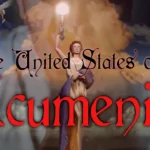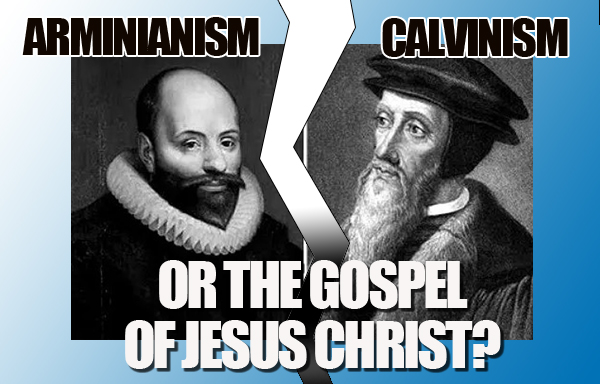Protestants view the Reformation as a great move of God. And rightly so! The Reformation brought the scriptures back into the hands of the common man. But as Philip Mauro explains in his exposition of the book of Revelation; Of Things Which Must Soon Come to Pass, wherever there is a great move to advance the Gospel of Jesus Christ, (symbolized by the White Horse and Rider going forth “Conquering and to Conquer,”) the Red Horse is ever at its heels, waging war against the truth. We see this in the many ideals, customs, and culture of the Catholic church that were carried over into the Reformed/Calvinist movement.
“So here we have the Lord’s own word, spoken at the first going forth of the gospel, that the immediate effect would be antagonism, variance, and deadly strife. We see therefore that the red horse was to follow hard upon the heels of the white horse. And now, to put the whole matter into a single vivid sentence, the Lord draws a word picture which strikingly agrees with this detail of the picture of the rider on the red horse, saying, “Think not that I am come to send peace on the earth; I came not to send peace, but a sword” (Matt 10:34) – Of Things Which Must Soon Come To Pass – Mauro, pgs 200-201
John Calvin, a Crypto-Jew (crypto just meaning “hidden”) and very likely a Freemason, ruled through a state supported church no differently than the Pope ruled through the Vatican. In fact Calvin was known as the “Pope of Geneva.”
Calvinists downplay the role their namesake played in the historical slow, torturous execution of the heretic, Servitus, among others. Servitus’ crime was that he denied the doctrine of the Trinity. He believed that God was one person, and that Christ and the Holy Spirit were merely expressions of God.
As Reformers tell the story, Calvin approved of the death penalty for Servitus (which in and of itself cannot be supported under the New Covenant), but that he requested the death be a humane, quick beheading. That would have been unusual since beheadings were the choice method of execution for criminals who broke civil law. Burning at the stake was the customary punishment for heretics condemned for breaking religious law, as Servitus had done. The depraved explanation (excuse) for the, long, arduous torture, was that the heretic might have the opportunity to repent. “Killing the body to save the soul.” The problem with that version of the story is that John Calvin was a very powerful man. If he had objected to Michael Servetus being burned alive, the city officials would very likely have gone along with his wishes.
We’ll get back to John Calvin, but first let’s look at the basic tenets of Calvinism, the still highly lauded teachings of this controversial man. I could just add a link, but thought it might be helpful to have an overview here.
Calvinism
Doctrinally, John Calvin is known for his “Doctrines of Grace”; “Five Point Calvinism” or “T.U.L.I.P.” These points are:
- Total Depravity
- Unconditional Election
- Limited Atonement
- Irresistible Grace
- Perseverance of the Saints
Total Depravity
Total Depravity states that all of mankind is completely sinful, or depraved. Man is corrupt and incapable of obeying the law of God. Most if not all Christians would agree that this is supported by (Rom 3:10, 3:23, Eph 2:1, Psalm 14:1-3, Rom 8:7-8).
Unconditional/Sovereign Election
Unconditional Election states that we cannot turn towards God on our own, that God elects believers to salvation, that salvation is not brought about in any way by our actions or decisions because we are spiritually dead, we will not turn towards God on our own. So God elects believers based solely on His grace and not our works and believers were chosen by God “before the foundation of the world.” (Eph 1:3-6) Some verses supporting this include, (Eph 1:5, Rom 8:28-30 , 2 Tim 1:9).
Limited Atonement
Atonement refers to the forgiveness of our sins through Jesus’ sinless life and sacrificial death. Christ atoned, or paid for our sins on the cross (1 Peter 3:18). That much is agreed upon by just about anyone considering themselves to be Christian. But Calvin’s Limited Atonement stands out in that it teaches that Jesus’ sacrificial death did not make salvation possible for everyone who chooses to receive it, but that salvation was made definite (only) for those who have been elected by God. In other words, Jesus did not die for all, but only the elect. “Four-Point Calvinism” or Amyraldism, the moderate form of Calvinism, rejects this teaching of Limited Atonement.
Irresistible Grace
No one can be saved unless they are first drawn by God. (John 6:44)
Perseverance of the Saints (aka Eternal Security)
If you have been justified before God you cannot lose your salvation. Once a person is truly saved, his salvation is eternally secure… I can hear the OSAS arguments already… 🙄
OK, so what about Armenianism? Isn’t it right because it teaches (deep breath of fresh air) 😃 FREE WILL!? If only it were that simple.
Here are the basic tenets of Armenianism.
Armenianism
Jacob Armenius, theologian and minister of the Dutch Reformed Church, was known for his doctrine of Free Will and disagreement with Calvin. His Five Articles of Remonstrance were (PCURC – no handy acronym):
- Partial Depravity
- Conditional Election
- Unlimited Atonement
- Resistible Grace
- Conditional Salvation
Partial Depravity
Partial Depravity teaches that humanity is sinful but, with the help of universal grace from God, still able to seek God. Human will is free, and all men have the power to respond to the influence of the Spirit.
Conditional Election
This refers to God only “choosing” those whom He knows will one day choose to believe. No one is predetermined for heaven or set on a path to inevitable salvation.
Unlimited Atonement
Jesus died for everyone, even those who are not “chosen” and who will not believe.
Resistible Grace
God’s call to be saved can be and often is rejected.
Conditional Salvation
Christians can actively reject the Holy Spirit’s leading in their lives and thus voluntarily give up their salvation. Salvation must be maintained to be retained. source
The chief criticism of Calvinism is its rejection of Free Will, as it teaches that Christ only died for the “elect.” If John Calvin was right, then man is utterly depraved and we can only see God if He chooses to reveal Himself to us. If he was right, then Jesus only died for those who God predestined to be saved. No need to reach the lost with the gospel; if you’re elect you’re elect. (Wait a minute… why is this starting to sound familiar? 🤔)
But God’s Word tells us that Jesus died for all.
He is the atoning sacrifice for our sins, and not only for ours but also for the sins of the whole world. (1 John 2:2, also 2 Pet 3:9)
The Lord is not slack concerning his promise, as some men count slackness; but is longsuffering to us-ward, not willing that any should perish, but that ALL should come to repentance (2 Pet. 3:9).
The argument against Armenianism is that it rejects the Grace and Eternal Security accomplished on the cross by Jesus Christ alone, or as modern Armenians call it, “Once Saved Always Saved” (OSAS). But what that amounts to is a doctrine of Works to receive and maintain your salvation. This flaw is the core of countless false teachings of Papal/Old Covenant Law in the church today, from those causing believers to question their own salvation to those adding so much Law to the Gospel of Grace that they are indistinguishable from the Judaizers of Paul’s day.
The “Calvin vs Arminius” argument served to divide the Reformers from day one and it continues to divide them today.
Who was right?
Were either of them right?
David Needham so beautifully wrote and I often quote,
“Did the epistles only make sense once the theologians had a chance to cut them apart and paste them back together?”
They most certainly did make sense long before either Calvin or Armenius had a go at them. This is where Needham’s book ‘Birthright” is so valuable, as it takes a fresh, scriptural approach to the topic.
With that much laid out, I need to switch gears for a moment.
I’ve written a lot about the Hegelian Dialectic the enemy uses to engineer society. Most are familiar with the tactic by now, but it works in the following way: The general public is offered “experts/leaders” to present opposing religious, political, or scientific positions (the “experts/leaders” play roles on both sides), creating layers upon layers of divisions in place of critical thought. For instance, rather than being able to properly articulate the grounds for their political views, most simply align themselves with the “Republican” or “Democratic” party. In the same way, most are unable to articulate or show you chapter and verse supporting their doctrinal beliefs, instead naming their association with a particular denomination, often adding a disclaimer that they don’t necessarily agree with everything the denomination teaches. Then they might Google up an article and parrot (or copy-paste) some self-appointed, often charismatic “expert” who does a good job describing the view they’re comfortable associating with.
Rather than the individual believer allowing himself to be led along by the Holy Spirit and studying it out in God’s Word for himself, we’ve been led to believe that we need to choose a “camp” in which to “hang our hat.” I was one of those believers until about ten years ago. It’s never too late to dig in and start searching out God’s Word for yourself!
Through these divisions, the world leaders create a constant “problem-reaction-solution” dynamic with which they steer the minds of the population to their desired worldview. The “Calvinism” vs “Arminianism” is one such manufactured division.
And the great division is not by happenchance! A careful examination of the two iconic leaders of the schism in the Reformation which to this day defines Protestantism reveals the involvement in the Reformation of both the Jesuits and the Jews. Beginning with John Calvin. According to Watch Unto Prayer and Biblelife.org,
“John Calvin aspired to create a spiritually pure “Kingdom of God” in Geneva, Switzerland. Today Calvinists teach that God has commanded the Church to establish His Kingdom on earth. The fruit of Calvin’s law bound theology was a theocratic dictatorship based on his false teaching that the Church is an extension of Israel.”
“The citizens of Geneva hated John Calvin as he clearly stated. In 1554 Calvin wrote ‘Dogs bark at me on all sides. Everywhere I am saluted with the name of ‘heretic,’ and all the calumnies that can possibly be invented are heaped upon me; in a word, the enemies among my own flock attack me with greater bitterness than my declared enemies among the papists.’ Calvin, quoted in Schaff, History, volume 8, page 496. The history of John Calvin’s reign of terror in Geneva is undisputed. Calvin himself kept historical records that have survived to this day…
“John Calvin had no love, compassion, patience or tolerance for those who did not believe his Institutes. Criticism of Calvin’s Institutes was considered heresy for which the sentence was death by burning at the stake. To his dying day Calvin preached and taught from his works… Source and Source <– (Both well worth a read).
So, if Calvin is a devil, we are turned to Arminius for sound doctrine. But the website GirdedWithTruth.org paints an unsettling backdrop for the would-be “hero.” (The first quote here is a little tough to read because it’s old. But you can do it!) 🙂
“If the joint verdict of Arminius himself, and of his English proselyte Hoord, will not turn the scale, let us add the testimony of a professed Jesuit, by way of making up full weight. When archbishop Laud’s papers were examined, a letter was found among them, thus endorsed with that prelate’s own hand: “March, 1628. A Jesuit’s Letter, sent to the Rector at Bruxels, about the ensuing Parliament.” The design of this letter was to give the Superior of the Jesuits, then resident at Brussels, an account of the posture of civil and ecclesiastical affairs in England; an extract from it I shall here subjoin:
‘Father Rector, let not the damp of astonishment seize upon your ardent and zealous soul, in apprehending the sodaine and unexpected calling of a Parliament. We have now many strings to our bow. We have planted that soveraigne drugge Arminianisme, which we hope will purge the Protestants from their heresie; and it flourisheth and beares fruit in due season. For the better prevention of the Puritanes, the Arminians have already locked up the Duke’s (of Buckingham) eares; and we have those of our owne religion, which stand continually at the Duke’s chamber, to see who goes in and out: we cannot be too circumspect and carefull in this regard. I am, at this time, transported with joy, to see how happily all instruments and means, as well great as lesser, co-operate unto our purposes. But, to return unto the maine fabricke:—OUR FOUNDATION IS ARMINIANISME. The Arminians and projectors, as it appeares in the premises, affect mutation. This we second and enforce by probable arguments.’”- Quote from Hidden Works of Darkness, pp.89-90. Edit. 1645.- GirdedWithTruthMinistries
“Professor Richard A. Muller, of Fuller Seminary, explains that Arminius’ doctrine of scientia media is Molinist. In fact, Molina’s work was in Arminius’ library, alongside many other Jesuit books. This idea is that there is a middle knowledge in between God’s intuitive knowledge and his decretal foreknowledge (what he decrees will happen). This middle knowledge rest upon the acts of his creatures. There is no determination of God here.
God’s prescience [foreknowledge] regarding a creature’s future acts, enables him to act accordingly and establish the right conditions. Muller shows that this not only affects human freedom in salvation, but destroys God’s sovereignty in the whole created order, which runs outside of God. Arminius was also accused of recommending to his students many Romanist works and emphasising a Jesuit theology, particularly Molina and Suarez. In his printed works,
Arminius refers to these Jesuit influences, but does not reference them! Deceit or what! In this way, Jesuit ideas were introduced into the Dutch Reformed Churches and so Arminianism/Semi-Pelagianism began in earnest. The great Puritan scholar, John Owen, writing in his Display of Arminianism (1642), shows awareness of the Jesuit connection: ‘How do they (the Arminians) and their fellows, the Jesuits …’” – The Roots of Armenianism – UnderstandingMinistries
Arminians (which includes the bulk of what is known today as Christianity) pave the narrow way with “thou shalt, thou shalt not” stumbling blocks, yet Jesus Himself is the narrow way – He is the way and no one comes to the Father except through Him, no one enters the Kingdom of God except IN Him.
As with all deception, Both Calvinism and Armenianism contain some truth, even much truth. But in reality, these are two great created theological systems, and both are deeply flawed, their origins suspect at best. As Got Questions points out,
“Either way, there seems to be an attack upon God’s character or Christ’s work—either God’s love is limited or Jesus’ power is limited.“
Dear believer, predestination vs free will is one of those things that are simply beyond our human understanding – and we should be alright with that! We are talking about holy, almighty God; the great being whose ways are far beyond our ability to comprehend, immeasurably above our own. What hubris would have us think that we should be able to pack all His unsearchable truths into tidy boxes of human logic? I like how Francis Schaeffer answered the question of Predestination vs. Free Will;
“We choose to be chosen.”
Amen!
I’ve come to really dislike the term “once saved always saved” because it’s so often said with a lilt of sarcasm, mocking the reality of what salvation miraculously and truly is. For more on that, please read my article “What the devil really doesn’t want you to know: Christian do you know who you are?”
I just did a query on “once saved always saved” and was floored at how many pages of results it turned up. OSAS is one heated topic! And no surprise! What could possibly be more important to the believer than to know with certainty that his humble faith in Jesus has forever secured his position in the lamb’s book of life? The social engineers have their hands in this one too, of course. If you’re talking “Eternal Security” to someone who believes in “Free Will” you’re immediately labelled a “Calvinist” and if you talk “Free Will” to someone believing in “Limited Atonement,” you’re labelled an Armenianist. Not a Christian. Not a brother. Rather an “Us” or “Them.” See how the dialectic works? And who might be behind it; one leading to an attack on either God’s Holy character and the other on Christ’s finished work? 🤔
But praise God! There is a third option: The Truth: The Gospel of Jesus Christ! It is spiritual truth that cannot be boxed up any more than the movement of the sun and the moon can be made sense of. The truth is beautifully presented in David Needham’s book and I did my best to present it in my book and the article above. But I recently found another humble voice that speaks truth straight from the Word of God.
A friend recently sent me this video. At first I was skeptical. Actually, I get so many “teaching” videos sent to me that my reply to her was something like, “🙄 OK. Now, who’s this guy?” But my heart quickly softened at the recognition of the truth as I watched. It poured over my soul like a healing balm – (as truth has a way of doing 😉). It was refreshing to hear David H J Gay address the “works“ of Calvinism; since it is typically associated with the “Grace” camp. The enemy’s religious control systems are always about man looking inward, trying to ascend and regain spiritual life through his own efforts rather than turning to His creator and trusting in the finished work of Jesus Christ, so false teaching always comes down to man-based works.
Mr Gay’s videos are brief (this one is just 13 minutes). I think you’ll be blessed to spend some time on his channel. I have been.
The video inspired this article.











